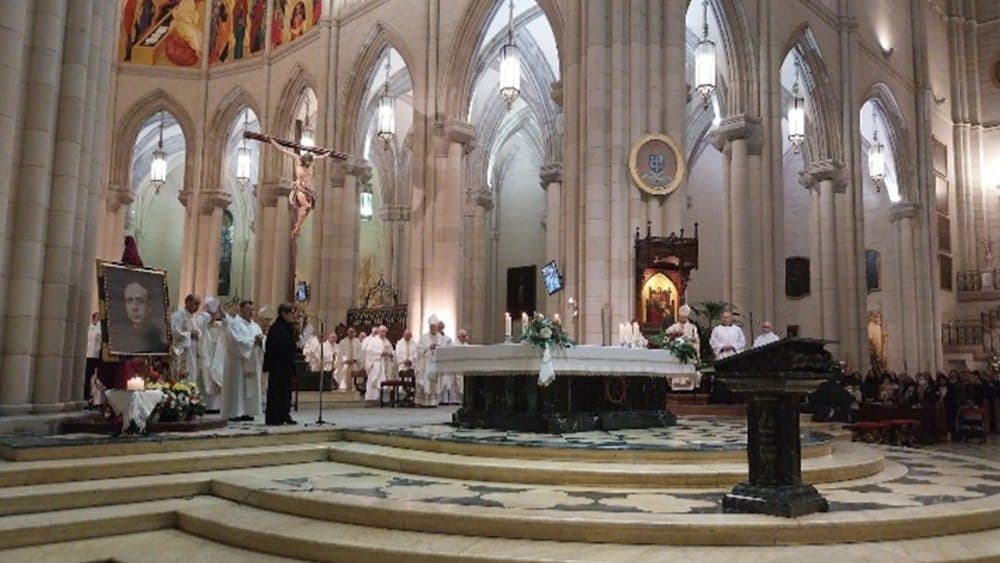In various places in the thirty countries where they are present, the members of the Teresian Institution (TI), together with family, collaborators, and friends, have raised with one voice and with immense joy, their thanksgiving for these hundred years that have passed since what a Pius XI, on January 11, 1924, promulgated the brief Inter frugiferas with the approval in perpetuity of the work founded by San Pedro Poveda.
On January 12, the Eucharist of thanksgiving for the centenary of the pontifical approval of the Teresian Institution was celebrated in the Cathedral of Santa María de la Almudena, Madrid (Spain), presided over by the Cardinal Archbishop, José Cobo and concelebrated by cardinals Antonio María Rouco and Carlos Osoro, auxiliary bishop Juan Antonio Martínez Camino, and about twenty priests. The director of the Institution, Gregoria Ruiz, and the Government Council attended as this was the opening ceremony of the centenary.
Communion and mission
“This afternoon we are a family, and we come together to pray and to give thanks for the gift of faith and the history that God has been weaving in these hundred years,” said the Cardinal Archbishop of Madrid, José Cobo Cano, in his homily.
In the opening statement, the director of the Institution, Gregoria Ruiz, stressed: “We come happy to be grateful that so many people, women and men in these hundred years have brought to life this charism of the Church and with their availability and self-sacrifice, their audacity and dedication, have announced Jesus Christ in various areas, contexts and cultures. We also come to renew the commitment to communion and mission in this time of grace, begging the Lord that the sap of holiness that he instilled in the beginning, continues to circulate and bear good fruit in today’s world, open to dialogue with everyone and especially sensitive to the realities and situations of the most vulnerable.”
That same day, January 12, similar events were held in the cathedrals of Seville, Malaga, Bilbao, Alicante, presided over by the titular bishops.
“Today also your Teresian family in the midst of the Church reminds us of those communities that are salt and light in the world. It is quite a trait, of people, of families, of communities, of friends, that, being eminently human, being and living as God’s task, are salt and light for our time” said the Cardinal Archbishop of Madrid, José Cobo.
The archbishop recalled features of the charisma and asked the Institution, in this polarized world, where there is populism and post-truth, to provide the torch of light and the flavor of Christ through transformative and integrative education. Also, do not stop “supporting and renewing and discovering the feminine face of this church and the role of women in it.”
Four continents
On Thursday, January 11, calls were held in other cities. In Italy: Rome, in the Basilica of Saint Agnes, Eucharist presided over by the Archbishop of Bologna, Matteo Zuppi, president of the Italian Episcopal Conference; Palermo, presided over by Archbishop Corrado Lorefice; and Rossano, by Archbishop Maurizio Aloise. In Spain: Barcelona, Santander, Oviedo, Palma de Mallorca, Guadix… In America: Lima, Buenos Aires, Santo Domingo… in the Philippines, Manila, Iloilo and Davao.
Full temples in places where the presence of the Institution is numerous and varied and proximity where there is a small but significant community, such as at the University of Belén, in Holguín (Cuba), in Kikwit (Congo), in Guatemala…
In Manila, the celebration was presided over by Cardinal Luis Antonio Tagle, Pro-Prefect of the Dicastery for Evangelization. “This centennial celebration is a great blessing not only for the Institution, but for the entire Church,” Tagle said in his homily. And he added that Saint Pedro Poveda imagined the Institution as a contribution to the mission of the Church, mainly through education and culture, but in the way of Jesus, in a humble way. Addressing the students of Poveda College, where the Eucharist was celebrated, he stressed: “Let us always learn from Jesus.”
The example of the first martyrs
“One hundred years: a beginning with a few, we must never forget it, and perhaps today when we experience weakness more, we are called to live the same creative passion of the beginning, for a new beginning that is not made for security, but for evangelical passion. Now you are a big family, in 30 countries on four continents, and you continue to look for the little ones in the many existential and social peripheries of our cities”, said Cardinal Zuppi at the celebration in the Basilica of Saint Agnes, where the Institution in Rome had been convened to highlight the martyrdom model and the first communities that from the beginning has guided the members of the Teresian Institution.
“Saint Agnes, whom Father Poveda proposed as a point of reference, and model for young women, – for her, he composed a short and intense prayer that asks us to imitate her love for Christ, her fidelity, her audacity,” he recalled in the presentation Paola Palagi, director of the Italian sector of the Teresian Institution. “The first Christians, a small number, but capable of being salt and leaven, of spreading the good news of salvation, the first Christians, those on the path, those who walk together, knowing that their citizenship is in heaven. For this faith and this hope, they are willing to take risks, to face suffering, opposition, misunderstandings and much even martyrdom. It is no coincidence, therefore, that we are gathered right here, in this basilica dedicated to Saint Agnes, which reminds us precisely of these values, of this horizon,” Palagi stressed.
Wherever there are members of the Institution, celebrations of thanksgiving to God and the Church continue to take place with the same feeling of gratitude and renewed commitment. The joy is shared with a good number of alumni, collaborators, friends, family, and priests who also feel like participants in the charism founded by Saint Pedro Poveda.










